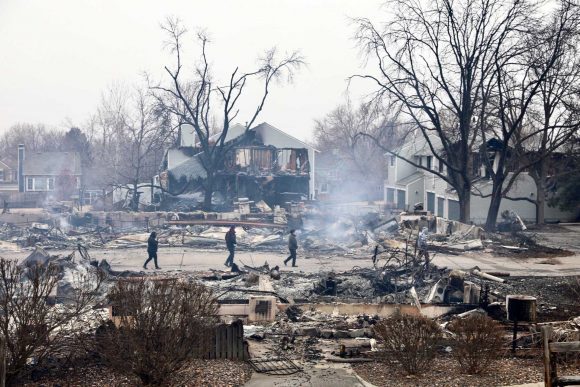
Damages from the Marshall and Middle Fork fires are seen within a residential area on Dec. 31, 2021. (Io Hartman/CU Independent)
Research released on Feb. 1 has found that crowdfunding campaigns in the aftermath of the Marshall Fire, the most destructive wildfire in Colorado history, were an important source of informal disaster insurance. The research also showed a large disparity in earnings between higher and lower-income households.
The Marshall Fire destroyed over 1,000 homes and damaged many more in December 2021.
“I have studied disasters as part of my main research…but until this disaster occurred so close to home, I didn’t realize how important crowdfunding had become as a source of funds,” said Emily Gallagher, assistant professor of finance at the University of Colorado’s Leeds School of Business, who co-authored the research with Tony Cookson, a Leeds finance professor.
Crowdfunding campaigns, such as GoFundMe, have raised over $23 million for Marshall Fire victims. However, Gallagher and Cookson’s research indicated that there are disparities between crowdfunding earnings that can be correlated to the personal networks of an individual.
“The mechanism is pretty simple, people have higher income and also tend to have friends who…have higher incomes,” said Cookson. “Lower-income people get less because their network is less prepared to help them in the case of a disaster.”
Their research of 975 GoFundMe campaigns for survivors of the Marshall Fire found that households with incomes of about $150,000 per year received the most earnings and 12% of fire survivors with a GoFundMe campaign received less than $5,000.
“When you’re talking about the enormous loss of losing your house and how underinsured people were, $5,000 was not going to go too far in terms of helping people,” said Cookson.
The findings revealed an important understanding of the necessity of crowdfunding platforms as a means of alternate disaster insurance. GoFundMe in particular has become one of the most popular sources of crowdfunding. Since 2013, disaster U.S. recovery campaigns on GoFundMe have risen from $3 million raised per year to over $106 million.
Colorado’s Division of Insurance found that approximately two-thirds of homes that were lost in the wildfires were underinsured. As the threat of wildfires increases in Western States like Colorado, insurance policies do not provide the safety net that disaster survivors rely on.
Unlike state and federal grants or credit-based personal loans, crowdfunding platforms provide instant liquidity of funds. This instant access to these accounts is vital for the replacement of the out-of-pocket soft costs for natural disaster survivors.
Its importance is particularly significant among lower-income households, whose financial standing often correlates with a diminished credit rating. Subsequently, receiving approval for personal loans to rebuild or repair homes after a disaster, such as the Marshall Fire, can become a challenge.
The researchers emphasized that while everyone who experiences a disaster such as the Marshall Fire needs support, it is important for people who can donate to look outside of their typical network to help community members who may have fewer people coming across their campaigns.
“I think its good for people to think about the fact that we have this very natural human urge to give to people we know, people who are like us, who are in our networks,” said Gallagher. “If you want to [donate] to a friend of a friend, that’s great, but maybe also look for a campaign of somebody who hasn’t raised very much and see if we can give to them as well.”
Contact CU Independent Special Issues Editor Lucy Adlen at lucy.adlen@colorado.edu.
